Dental Implants in Groton, CT
Bridgeworks Family Dental Center provides dental implants in Groton, CT. Call us at 860-446-8744 to make an appointment.
Single Tooth Dental Implants
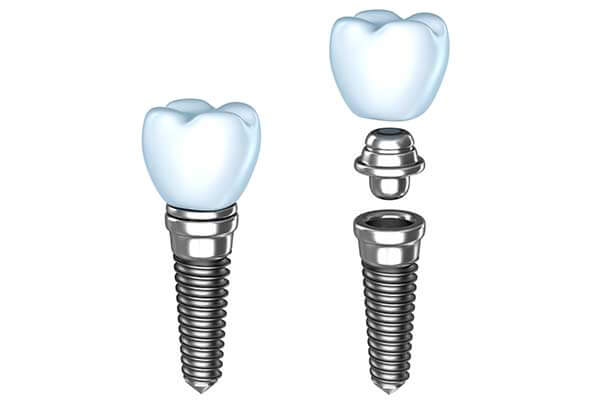
Dental implants replace tooth roots in the mouth. Implants provide a strong foundation for fixed or removable replacement teeth and can aid in the prevention of bone loss in the jaw.
What is a Dental Implant?
Dental implants are small anchors made of a biocompatible metal called titanium that are placed in the jawbone. Dental implants are the replacement of tooth roots in the mouth. Once placed, the anchors begin to fuse with the bone over the course of a few months. After the fusing process, known as osseointegration, abutment posts are inserted into the anchors to allow for the permanent attachment of the replacement teeth.
Implant Supported Bridges
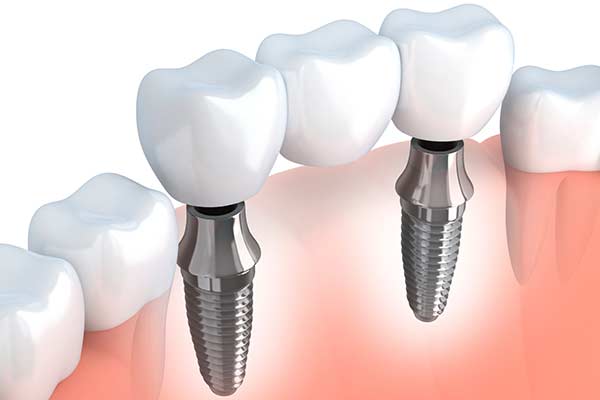
An implant supported bridge is a restorative solution for spaces where three or more adjacent teeth are missing. This restoration typically requires two implants to support the porcelain bridge. The bridge provides a functional and aesthetic replacement for a patient’s natural teeth.
What are the advantages of an implant supported bridge?
Because of the natural look and feel of the porcelain and the functional stability provided by the implants, implant supported bridges are an effective solution to replace multiple missing teeth.
A traditional bridge uses teeth on either side of the gap where teeth are missing for support. An implant supported bridge uses two or more dental implants rather than the adjacent teeth. When a bridge uses natural teeth for attachment, the natural teeth must be prepped for crowns and are then subject to increased stress which may be damaging – particularly if the existing tooth, roots, or surrounding bone structure are already compromised. A dental implant supported bridge replaced your missing teeth and avoids putting any additional stress on your natural teeth.
Implant Supported Dentures
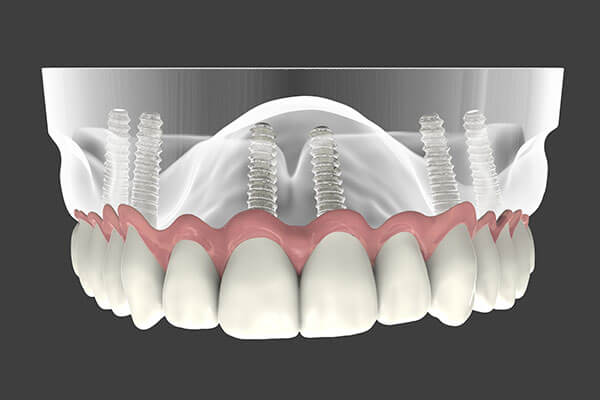
For patients who are missing many or all of their teeth, implant supported dentures may be an alternative to traditional dentures. This solution requires the placement of two or more implants. In order to replace a full arch denture, a minimum of four implants is generally recommended. Eligibility for this solution is dependent upon a number of factors, with jaw bone density being one of the most significant determining factors.
Traditional dentures rely on an acrylic base that sits directly on the gums, held in place by a paste or adhesive. Using implants as supports for dentures allows for a smaller and more comfortable base and less shifting of the prosthesis during use.
Implants can support both full and partial dentures as well as both fixed and removable dentures. If a removable denture is selected, the denture will “snap” on to the implant rather than requiring the use of denture paste or adhesives.
Why should I consider implant-supported dentures over traditional dentures?
This technique offers many advantages over traditional dentures.
Easy to care for, this solution can simulate the look and feel of natural teeth and stay fixed in place with the implants acting as anchors. Patients will not experience the typical rocking and movement or gum irritation associated with dentures.
Dental implant placement can also help alleviate the sunken look that can occur with bone loss in the jaw by stimulating bone growth in the area around the implant. This process can also help prevent future bone loss.
Full Arch with Only Four Implants
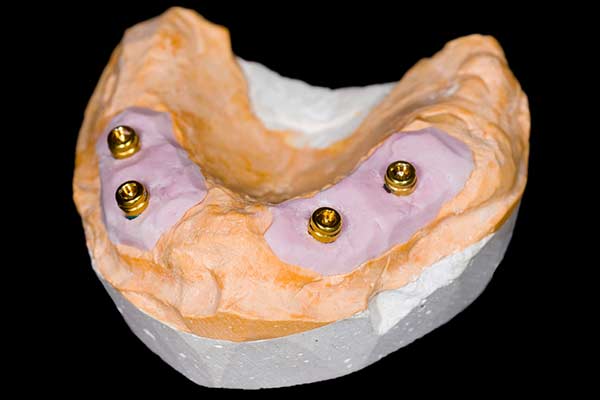
This procedure is a unique implant solution that allows patients with a completely edentulous (toothless) upper or lower arch to replace all of the teeth in that arch using only four implants as anchors.
Guided Implant Placement
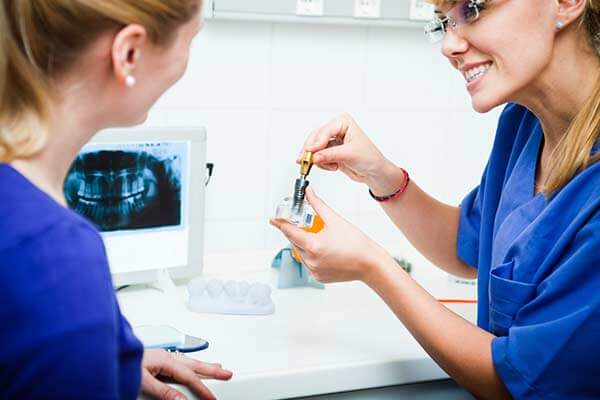
Using CBCT scans, virtual treatment planning, and highly specialized training, we are able to provide custom guided implant placement for our patients. These guides direct the exact location, angle, and depth of each implant placement. The use of the guide increases the accuracy, efficiency, safety, and predictability of the procedure.
Dental Implants FAQs
How much does a dental implant cost for one tooth?
A single-tooth dental implant ranges from $3500 to $6700, with the cost depending on the materials used, the tooth being replaced, and any supplementary procedures needed prior to dental implant surgery like bone grafting or a sinus lift.
Do you get a temporary tooth with an implant?
Yes, if you would like a temporary tooth, we can provide one to you to fill the gap in your smile while you wait for your permanent restoration.
Do teeth implants hurt?
No, during your implant surgery, your mouth will be numbed, so you won’t feel any pain at all while we work. After your surgery, the local anesthetic will wear off and it’s likely that you will experience some amount of discomfort and tenderness. We will provide you with instructions to help minimize pain, but most patients describe implant surgery recovery as less painful than that of a tooth extraction.
Can a bridge be replaced with an implant?
Yes, many of our patients choose to replace a traditional dental bridge with one or more dental implants instead.
Are implant-supported dentures permanent?
Implant-supported dentures can be permanent—in other words, they can only be removed by a dentist—or removable. Removable dentures are also known as snap-on or snap-in dentures. Whether or not your implant-supported dentures are removable or fixed, the implants placed in your jaw are permanent and with proper care and maintenance, they will last a lifetime.
What is a full arch implant?
A full arch implant restoration replaces an entire arch of upper or lower teeth. With our full arch with only four implants procedure, we can replace a single arch using the support of only four dental implants.
How long do dental implants last?
With optimal care and regular dental visits, you can expect your dental implants to last decades or even a lifetime. They’re meant to be a permanent replacement for missing teeth. That said, the restorations that are attached to your implants may need occasional replacement, depending on the materials used to make them and the amount of wear they receive.
Can you get dental implants years after extraction?
Yes, you can get dental implants no matter how long it’s been since your teeth were extracted. If your teeth have been missing for some time, it’s possible that you may have experienced some amount of bone loss. We will assess the amount of bone in your jaw to make sure it is sufficient to support your dental implants; if you need additional support, you may require bone grafting or a sinus lift prior to dental implant surgery. These procedures have a high success rate and will ensure that your dental implant surgery produces a stable, strong bite.
We believe everyone deserves access to quality dental care that not only restores function but also enhances confidence. Whether you're interested in cosmetic dentistry to achieve a beautiful smile or need restorative dentistry for replacing missing teeth, our skilled team is here to help. We treat a wide range of dental concerns, including damage caused by injury, using advanced techniques and personalized care. Don’t wait—schedule your appointment today and take the first step toward a healthier, more radiant smile.
The Benefits and Importance of Dental Implants
Want to know more about why you should choose dental implants?
Learn More About the Benefits of Dental Implants